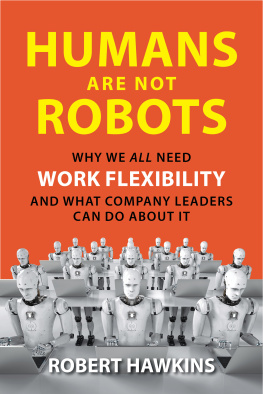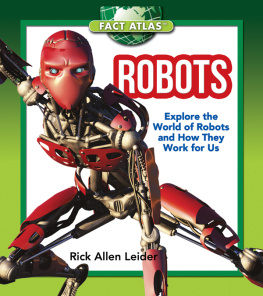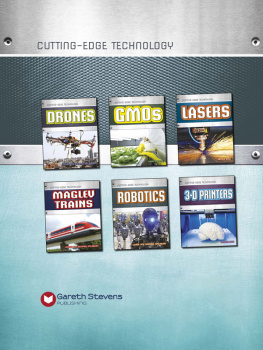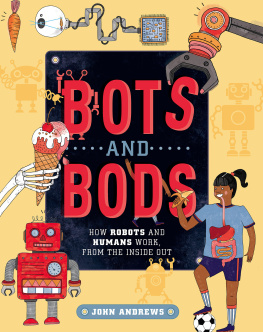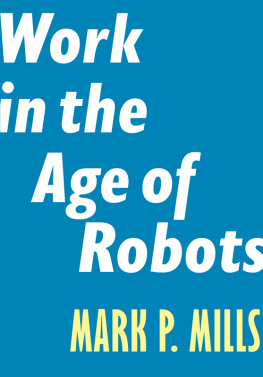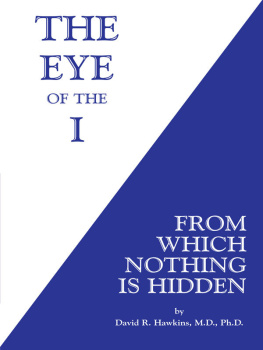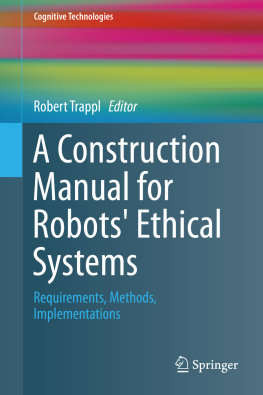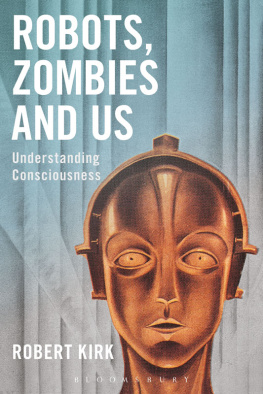Robert Hawkins - Humans Are Not Robots
Here you can read online Robert Hawkins - Humans Are Not Robots full text of the book (entire story) in english for free. Download pdf and epub, get meaning, cover and reviews about this ebook. year: 2020, publisher: Maven House, genre: Home and family. Description of the work, (preface) as well as reviews are available. Best literature library LitArk.com created for fans of good reading and offers a wide selection of genres:
Romance novel
Science fiction
Adventure
Detective
Science
History
Home and family
Prose
Art
Politics
Computer
Non-fiction
Religion
Business
Children
Humor
Choose a favorite category and find really read worthwhile books. Enjoy immersion in the world of imagination, feel the emotions of the characters or learn something new for yourself, make an fascinating discovery.
- Book:Humans Are Not Robots
- Author:
- Publisher:Maven House
- Genre:
- Year:2020
- Rating:4 / 5
- Favourites:Add to favourites
- Your mark:
- 80
- 1
- 2
- 3
- 4
- 5
Humans Are Not Robots: summary, description and annotation
We offer to read an annotation, description, summary or preface (depends on what the author of the book "Humans Are Not Robots" wrote himself). If you haven't found the necessary information about the book — write in the comments, we will try to find it.
Humans Are Not Robots — read online for free the complete book (whole text) full work
Below is the text of the book, divided by pages. System saving the place of the last page read, allows you to conveniently read the book "Humans Are Not Robots" online for free, without having to search again every time where you left off. Put a bookmark, and you can go to the page where you finished reading at any time.
Font size:
Interval:
Bookmark:

HUMANS ARE NOT ROBOTS
HUMANS ARE NOT ROBOTS
Why We All Need Work Flexibility and What Company Leaders Can Do About It
Robert Hawkins

MAVEN HOUSE
Published by Maven House Press, 17 Church St., 2nd Floor, Lambertville, NJ 08530; 610.883.7988; www.mavenhousepress.com.
Special discounts on bulk quantities of Maven House Press books are available to corporations, professional associations, and other organizations. For details contact the publisher.
Copyright 2020 by Robert Hawkins. All rights reserved. No part of this publication may be reproduced, stored in or introduced into a retrieval system, or transmitted in any form or by any means (electronic, mechanical, photocopying, recording, or otherwise) without either the prior permission of the publisher or authorization through payment of the appropriate per-copy fee to the Copyright Clearance Center, 222 Rosewood Drive, Danvers, MA 01923; 978.750.8400; fax 978.646.8600; or on the web at www.copyright.com.
While this publication is designed to provide accurate and authoritative information in regard to the subject matter covered, it is sold with the understanding that the publisher is not engaged in rendering legal, accounting, or other professional service. If legal advice or other expert assistance is required, the services of a competent professional person should be sought. From the Declaration of Principles jointly adopted by a Committee of the American Bar Association and a Committee of Publishers and Associations
Library of Congress Control Number: 2020939038
Hardcover ISBN: 9781947540040
E-book ISBN: 9781947540057
CONTENTS
To Andi,
Forever my muse
robot noun
1: a machine with a human appearance or functioning like a human.
2: a machine capable of carrying out a complex series of actions automatically.
3. a person who works mechanically and efficiently but insensitively.
[Czech, 1920, from robota forced labour]
Australian Concise Oxford Dictionary, fifth edition (2017)
CHAPTER 1
Introduction
Forget the old concept of retirement and saving for the future there is no need to wait and every reason not to. Whether your dream is escaping the rat race, experiencing first-class world travel, earning a monthly five-figure income with no management, or just living more and working less, this book is the blueprint.
Marketing Blurb, The 4-Hour Workweek (2007)
Why This Book?
T HE 4-HOUR WORKWEEK, written by Tim Ferriss in 2007 as a guide for people who want to escape their normal jobs and have more life, tapped into something big.
Whenever I had my copy out in public, a stranger would often give me a sly, sideways smile to show that they too were discovering the secret recipe to freedom. Or sometimes, if they were a little braver, they would walk up, interrupt my lunch, and ask me if I had found my muse a side hustle designed to create a passive income allowing this escape from the normal working world. Not a lot of books create this bridge between strangers. Not a lot of books tap into a shared feeling, a shared desire, a shared pain. Not to this extent.
Over 2.1 million people in the United States alone bought The 4-Hour Workweek,automate and outsource the entire process so all they had to do was sit on a beach in Rio and check their ever-growing bank accounts (once a week, on Monday mornings). The premise of the book was not to help people become billionaires, or even millionaires, it was to help them make enough money to replace a traditional salary so they could free themselves from the traditional workplace.
I was one of those people. But it wasnt until years later that I started to wonder why we felt like we needed to free ourselves in the first place. Why were peoples normal jobs and normal workplaces so painful that the idea of escaping them warranted interrupting a strangers lunch just to check the progress of their muse? No one ever comes up to me when Im reading The Lord of the Rings to see if Frodo has finally destroyed the One Ring. No, theres something much more real about this pain. Theres a collective knowledge that something is fundamentally wrong with our lives and the way we work.
Some of us did manage to escape our normal jobs. Im sure thousands of ex-accountants and ex-plumbers produced wonderful side businesses that mostly look after themselves with online sales funnels and virtual assistants in Mumbai and now theyre sitting back at a caf in Madrid, sipping sangria, laughing at the old ways.
But many of us are still trapped. Many read the recipe, tried, and failed (me included its called The Spectacular Mens Underwear Failure of 2014; you get the picture). Many scanned the book, scoffed, and put it back on the shelf, thinking it was a bit far-fetched. Many never saw the book and are not aware of mini-retirements or muses and still work their usual jobs because its all they know. And some most are those normal people who just want to make as much money as they can, in an ordinary and secure way, to provide food, a place to live, financial security, and the occasional holiday to Bali for their family without the stress of wondering when or from where their next paycheck is going to arrive. Most of us have always depended on normal jobs, and most of us will always depend on normal jobs.
But, again, these normal jobs are painful.
We are all bound in friendship through this universal foe. We work hard and long weeks, and easily connect with strangers by merely saying TGIF! With our normal job, we sell our lives, our freedom, our humanity, to make a living and survive. This way of existing is unsustainable and damaging to our world, and, as well find out later, completely unnecessary and not even profitable for the businesses that we work for.
But things are changing.
Globally, a social revolution specifically regarding work: the way we work, the amount of control businesses have over us, and the realization that the way a business is managed impacts our lives and the world outside the sliding doors is slowly getting louder.
The drums of discontent are uniting in a chorus thats saying its not enough for a few lucky individuals to have a life of quality, that this life should be available to us all.
Women, for the most part, are beating those drums. This half of the population, who have fought so hard for so many years to be taken seriously in the working world, are now saying, Something is still not right. I should be able to pick my kids up from school and eventually be the CEO or a director. Why the hell not? And why am I still doing all the housework?!
Theyre seeing that even though they have increased access to flexibility at work, theyre still doing the majority of the housework, still hurting their careers because theyre being perceived as uncommitted slackers (and being called working mothers when no man in the history of the universe has been called a working father), and still feeling guilty for using flexibility when everyone else is stuck in the office.
More women than ever before are starting businesses, partly because when theyre their own boss they arent constrained by rubbish traditions. They find that they really can have and do it all when they have the power to manage their lives work, kids, sleep, and everything in between in a holistic way.
And its not just women. Millennials (and the upcoming Gen Zs), in typical millennial fashion, are demanding more of life and their bosses and the people around them by asking that simple yet often demonized question: Why? As in, Why am I forced to sit here till five? I finished everything I had to do two hours ago. Or, Why do you do it this way? I can write a program that could do it in a fraction of that time. Or, Why should I care? How does this job impact the planet?
Next pageFont size:
Interval:
Bookmark:
Similar books «Humans Are Not Robots»
Look at similar books to Humans Are Not Robots. We have selected literature similar in name and meaning in the hope of providing readers with more options to find new, interesting, not yet read works.
Discussion, reviews of the book Humans Are Not Robots and just readers' own opinions. Leave your comments, write what you think about the work, its meaning or the main characters. Specify what exactly you liked and what you didn't like, and why you think so.

